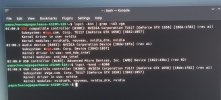this is the section i am referring to where the radeon card isn't listed. neither are the usual radeon or amdgpu drivers.Graphics:
Device-1: NVIDIA TU117 [GeForce GTX 1650] vendor: eVga.com. driver: nvidia v: 535.104.05 arch: Turing pcie: speed: 8 GT/s lanes: 8 ports: active: none off: HDMI-A-1 empty: DP-1,DP-2 bus-ID: 01:00.0 chip-ID: 10de:1f82
Display: x11 server: X.Org v: 1.21.1.7 with: Xwayland v: 22.1.8 compositor: kwin_x11 driver: X: loaded: nvidia unloaded: fbdev,modesetting,nouveau,vesa gpu: nvidia,nvidia-nvswitch display-ID: :0 screens: 1
Screen-1: 0 s-res: 1920x1080 s-dpi: 92
Monitor-1: HDMI-A-1 mapped: HDMI-0 note: disabled model: Samsung LF24T35 res: 1920x1080 dpi: 92 diag: 606mm (23.9") API:
OpenGL v: 4.6.0 NVIDIA 535.104.05 renderer: NVIDIA GeForce GTX 1650/PCIe/SSE2 direct-render: Yes
for comparison, this is from my intel/nvidia system where both Devices are listed along with their drivers and other info:
Code:
inxi -Fnxxz
<snip>
Graphics: Device-1: Intel 4th Gen Core Processor Integrated Graphics vendor: Lenovo driver: i915
v: kernel bus-ID: 00:02.0 chip-ID: 8086:0416
Device-2: NVIDIA GK107GLM [Quadro K1100M] vendor: Lenovo driver: nouveau v: kernel
bus-ID: 01:00.0 chip-ID: 10de:0ff6
Display: x11 server: X.Org 1.20.11 compositor: xfwm4 driver: loaded: modesetting
unloaded: fbdev,vesa resolution: 1280x720~60Hz s-dpi: 96
OpenGL: renderer: Mesa DRI Intel HD Graphics 4600 (HSW GT2) v: 4.5 Mesa 20.3.5
compat-v: 3.0 direct render: Yes
<snip>

